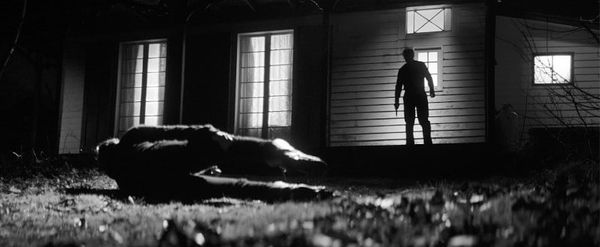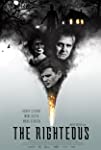Eye For Film >> Movies >> The Righteous (2021) Film Review
The Righteous
Reviewed by: Jennie Kermode

Frederic (Henry Czerny), a former priest, is always watching the skies. About halfway through Mark O’Brien’s uneasy little fable, he’s asked about his thoughts on the Devil. But it’s not the Devil he fears. It’s God.
In the earliest texts of the Abrahamic religions, there is no Devil as he’s thought of today. There doesn’t need to be. God is recognised as terrible in His wrath, and for a good number of those who study this theology as well as adhering to it, this remains the case. After all, it is not the Devil who will ultimately cast Judgement, not the Devil who will unleash the Four Horsemen of the Apocalypse. Free will, Frederic notes, allows us to choose our own paths; if we fall into temptation, that is our own responsibility.

Frederic is in a dark place when this film opens. He and his beloved wife Ethel (Mimi Kuzyk) – the woman for whom he left the priesthood – have just buried the little girl whom they adopted from troubled local woman Doris (Kate Corbett). They need time alone to grieve, but their period of mourning is interrupted by the arrival of a young stranger, Aaron (writer/director Mark O’Brien), late one night. He has an injured leg and begs for their hospitality. Frederic is cautious – they are, after all, an older couple living in a remote house on the outskirts of town – but wants to do the right thing. They bring him in and give him food, but when the conversation begins to make her uncomfortable, Ethel calls the police. An officer comes out. Frederic send her away, claiming that he knows the young man. He would seem to have sprung a trap upon himself – but why?
A handsomely staged albeit somewhat theatrical début from the Canadian director, The Righteous plays out as a series of conversations conducted in or around the lonely house, where an empty bedroom is testament to the couple’s loss. Right from the start, viewers will suspect that the child’s death and Aaron’s arrival are linked in some way, but O’Brien doesn’t place the weight of his story on that alone, delving way back into the characters’ pasts to identify the troubles within and between them. It’s a story which examines numerous aspects of scripture (though not in a way that will exclude viewers with limited knowledge of this), but which also raises moral questions which are difficult regardless of one’s background, exploring what it means to commit oneself to an ideal when merely human, and challenging the institutions which might ask that of us. Here, the sins of the Church are entangled with those of its followers.
Scott McClellan’s gorgeous black and white photography picks out every detail of the actors’ faces yet masks them in shadow at crucial moments, allowing truths to emerge only slowly. Secrets do not stand alone but are addressed in the context of the corruption that might spread out from them, sins begetting further sins, gradually eating away at the soul. The relationship between guilt, innocence and violence proves complicated. As events tumble toward their conclusion, it is hard to know how much of what we see is ‘real’, how much a manifestation of belief, but perhaps damnation is what it is regardless.
Screening at Fantasia 2021, The Righteous is, inevitably, being viewed through a horror lens, but it stands outside what mot people would think of as genre fare. Its concerns are intellectual, spiritual, existential; it will appeal to a broader audience, though its slow pace and formal style mean it’s unlikely to reach far beyond the arthouse. Impressive though its is, something about it still feels incomplete, as if O’Brien is testing the waters before embarking on something still more powerful. Nevertheless, it is a bold and enthralling piece of cinema.
Reviewed on: 18 Aug 2021
















